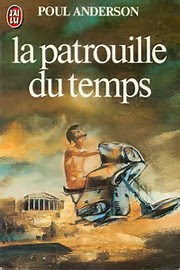SM Stirling comments in the combox here that we have to be careful when discussing time travel because English assumes:
the possibility of simultaneity;
the flatness of space;
the invariabilty of time.
Simultaneity works within practicable limits, e.g., when we say that it is midday simultaneously in two nearby cities, the difference is too small to notice or to matter.
I think that the variability of time is time dilation. The "time travel" experienced both by HG Wells' Time Traveler and by Poul Anderson's mutant time travelers, including Jack Havig, is fututrewards or pastwards time dilation. It is nonsense to say, as Wells does, that the Time Machine accelerates along time. The Machine, like everything else, does not move but extends or endures in that direction. The Time Traveler decelerates the motion of every particle, cell and neuron in his body so that his world-line extends further than anyone else's along the fourth dimension although (somehow) invisibly and intangibly.
By contrast, a Time Patrol timecycle does not extend between its departure and arrival points but merely disappears from one set of spatiotemporal coordinates and appears at another. Thus, it might instead (re)appear in another or subsequent timeline whereas the the Time Traveler and Havig merely extend along, and therefore also remain within, a single timeline.
The temporal corridors in The Corridors Of Time extend along a single timeline and therefore do not give access to any divergent or alternative timelines.

3 comments:
Kaor, Paul!
I've also thought of Einsteinian time dilation as a kind of time traveling. Far too briefly, to people traveling in spaceship STL time passes for them, outside their ships, than for the people they left behind on planets like Earth. A concept we see Anderson using in stories featuring STL, such as "Star Ship" or TAU ZERO.
Sean
Sean,
"Time travel" must include pastward travel.
Paul.
Kaor, Paul!
I agree! That's why I only called Einsteinian time dilation at STL space travel a "kind" of time travel.
Sean
Post a Comment